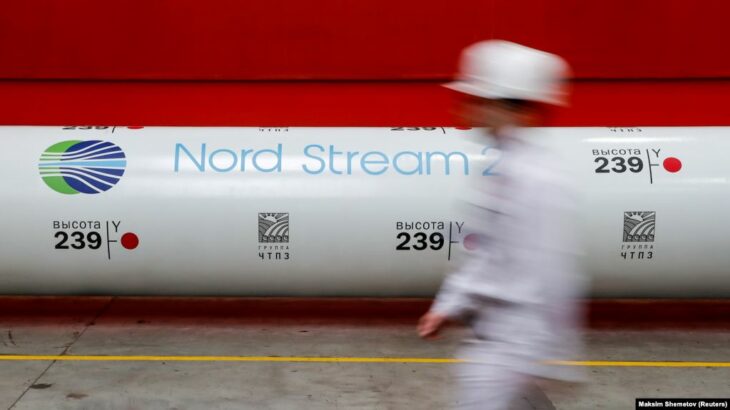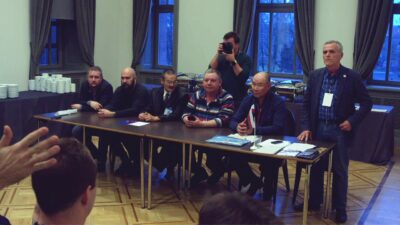
The European Parliament has passed a resolution calling on the European Union to “immediately” stop completion of the Nord Stream 2 pipeline to take Russian natural gas to Germany in response to the weekend arrest of Kremlin critic Aleksei Navalny.
European lawmakers on January 21 voted overwhelmingly — with 581 votes in favor, 50 against, and 44 abstentions — to call on the EU and its member states to “critically review cooperation with Russia in various foreign policy platforms and on projects such as Nord Stream 2.”
Navalny was detained at Sheremetyevo airport late on January 17 upon his return to Moscow after being treated in Germany for a nearly fatal poisoning with a nerve agent in August 2020.
The next day he was remanded in custody for 30 days in a summary hearing held in a Moscow police station. The court claimed he violated probation requirements in a previous criminal case that is widely considered trumped up and politically motivated.
Russia has rebuffed the global outrage and chorus of international calls demanding Navalny’s release. He faces up to 3 1/2 years in prison.
The nonbinding resolution urges member states to take an active stance on the arrest of Navalny and his followers at their next meetings and to “significantly strengthen the EU’s restrictive measures vis-a-vis Russia.”
This includes expanding asset freezes and travel bans already imposed on those held responsible for Navalny’s poisoning to include “individuals and legal entities” involved in the decision to arrest and imprison the opposition leader.
Those targeted by sanctions should also include “Russian oligarchs,” President Vladimir Putin’s “inner circle,” and “media propagandists,” according to the resolution, which also calls on the bloc to “devise a new strategy for the EU’s relations with Russia, centered around support for civil society.”
Manfred Weber, the leader of the conservative European People’s Party (EPP) faction in the European Parliament, and a close ally of German Chancellor Angela Merkel, told Der Spiegel Online that after the nerve agent attack and arrest of Navalny, energy issues must be put on the table.
“This is the most powerful instrument we have. And the Nord Stream 2 project is therefore one of the ways to generate further pressure,” he said ahead of the vote. “Simply appealing to Russia is not enough.”
Any additional sanctions on Russia would need unanimous consent from all 27 EU member states.
EU foreign ministers are expected to discuss the issue next week, but any concrete decisions are likely to wait until the completion of Navalny’s judicial proceedings.
There is mounting pressure on the German government at home and abroad to halt Nord Stream 2, which is designed to double capacity of the existing undersea Nord Stream gas pipeline from Russia to Germany.
The U.S. government and several EU members want to prevent the pipeline from being completed, saying it will strengthen Russia’s energy hold on Europe and undercut Ukraine’s role as a transit country for Russian gas.
On January 19, the United States sanctioned a Russian pipe-laying vessel in its latest bid to stop completion of pipeline, which is 94 percent completed.
Despite the growing criticism, the German Economy Ministry said on January 20 its plans for the project were “unchanged.”



